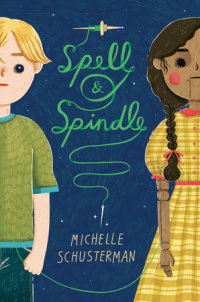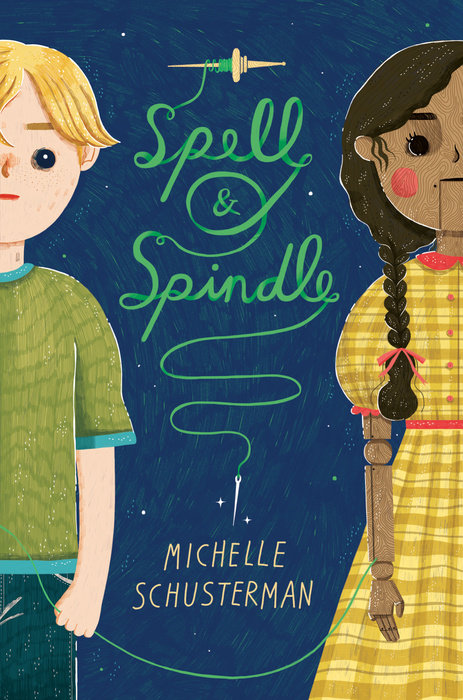Spell and Spindle
Doll Bones meets Splendors and Glooms as a boy who trades bodies with a wooden marionette. . . .
The Museum of Peculiar Arts holds many oddities--a mechanical heart, a diary bound in its owner's skin . . . and Penny, a child-size marionette who almost looks alive. Fog clouds Penny's memories from before the museum, but she catches glimpses here and there: a stage, deep red curtains, long-fingered hands gripping her strings.
One day, a boy named Chance touches Penny's strings and hears her voice in his head. Penny can listen, and watch, and think?
Now someone else is watching Penny and Chance--a man with a sharp face, a puppeteer who has the tools to change things. A string through a needle. A twist of a spindle. And suddenly Chance is trapped in Penny's marionette body, while Penny is free to run and dance. She knows that finding a way to switch back is the right thing to do. But this body feels so wonderful, so full of life! How can Penny ever return to her puppet shell?
An Excerpt fromSpell and Spindle
Just one block from the west lawn of the city’s largest park stood an unusual museum. In the many decades it had called this spot home, it had changed names frequently. Some of the city’s residents remembered it as the Miracle Rooms. A few elderly citizens swore it had been called the Memory Theater, while others argued it was actually the Hall of Wonders.
Its original owner was a famed cabinetmaker, a man rumored to have had the ability to draw magic from wood. He was said to have built one particularly magical cabinet to house all the others: chambers of infinite cabinets filled with his legendary collection of curiosities. The cabinet containing the chambers had been lost in the great fire that devoured much of the city half a century ago, but old-timers could often be heard spinning yarns about its vastness: “It was a beautiful oak cabinet, and inside was an endless maze of cabinets, all filled with the most bizarre things you’d ever laid eyes on.”
“Open one and you might find a display of Minotaur horns or scraps of wood from the Trojan horse. Open another and you’d be looking at a genuine fairy skeleton!”
“I was too young to remember, but my granddaddy said he was lost in there for weeks—ate his own socks before he found his way out!”
Nowadays the little museum housed all that remained of the cabinetmaker’s collection. While children still listened with starry eyes to the tales of its former grandeur, adults merely shook their heads with a mixture of amusement and distaste. Because in this modern age, such dusty old arti- facts were called “oddities” at best, and “horrors” at worst. As a compromise, the institution now bore the somewhat sardonic title of the Museum of the Peculiar Arts. But it wouldn’t for much longer, as it had recently been sold, and the new owner had other plans for the building.
An elderly man named Fortunato had inherited the museum from the cabinetmaker. Fortunato had been orphaned at a young age, and the old cabinetmaker had taken him in. Selling the museum had broken Fortunato’s heart, as it was all he had left of the man he’d called Papa.
Back when the city had been weak and struggling, poor citizens had been happy to drop a few coins for any form of entertainment. But one great war later, the city was different—a prosperous, booming beast, its ego constantly fed and fueled by its inhabitants, making it more glamorous (and more ghastly) than ever. Few were interested in spending their leisure time inspecting dusty oddities and cursed relics.
Fortunato lived above the museum, on the second floor. The Bonvillain family lived on the floor above him. Mr. Bonvillain was the museum’s accountant, and when Fortunato informed him the place was closing, he waited until the poor old man was out of sight before dancing a little jig. Mr. Bonvillain felt certain this was a sign that there was something better out there for him. And sure enough, within a week he landed a job at a brand-new bank in the shiny financial district and immediately bought a brand-new house in the suburbs to match. It was, he and his wife told their children, an opportunity to “move up in the world.”
Constance, his perpetually cheerful thirteen-year-old daughter, agreed. Like her parents, she believed all change could be good so long as you stayed positive about it. And besides, she had been raised to be an obedient young lady who always expressed agreement with her mouth, even if her brain and heart felt otherwise.
Eleven-year-old Chance was another story. He found his family’s relentless optimism to be a real downer. The suburbs sounded boring beyond belief, the opposite setting for the kind of action and adventure his heroes from comic books and television and radio experienced. He dreaded the thought of giving up his after-school job as Fortunato’s apprentice for something dull, like mowing lawns. Who in their right mind could possibly prefer pulling weeds in some stupid flower garden to handling fantastically grotesque and potentially dangerous objects in the quiet dark of a museum?
But Chance thought his father was right about one thing: the closing of the Museum of the Peculiar Arts was an opportunity.
An opportunity for Chance to finally have a real adventure of his own.
A natural-born pessimist, Chance was greatly misunderstood by his family, who had spent his entire life trying to cheer him up. They mistook his pessimism for sadness or anger. But really Chance was just preparing for the worst. Because at some point, he figured, the worst was bound to come for you.
Exactly one week before the big move, Chance turned on the family’s old radio and waited for his favorite pro- gram. The Bonvillains had a television, too, but Chance preferred imagining scenes playing out in his mind as he listened. Constance sat cross-legged on the carpet next to him, a brochure opened in her lap. Welcome to Daystar Meadows, it read over a photo of a smiling family of four standing in front of a blue house with white trim. Opening Summer 1952!
“We’ll have a backyard,” Constance said, turning the page. “I could plant a garden. Ooh, look at those white picket fences—perfect for rosebushes!”
Chance squinted at a photo of a street. “The houses all look the same.”
“Not exactly,” Constance pointed out. “The paint jobs are different. Dad says ours is yellow.”
“So when it gets egged, it’ll blend in?”
His sister giggled. Chance’s parents found his constant negativity worrisome, but Constance seemed to love him all the more for it. She was a good sister, he thought, though exhaustingly upbeat.
Constance flipped back to the picture of an empty grass lawn and started to list all the possibilities: a garden, a swing set, a pool. But Chance didn’t see what was so great about a backyard when you could have an entire city as your playground.
“A storm is brewing,” a crackly voice came through the radio speakers, and Chance hastily turned up the volume. “Are YOU prepared for the worst?”
Constance fell silent at once and closed the pamphlet. Storm at Dawn was a popular program, and Chance’s fa- vorite. Most listeners—like Constance—found the Storm’s constant doomsday warnings to be more amusing than ominous. Chance, on the other hand, thought the character was wiser and braver than anyone he’d ever met in real life. He felt a deep kinship with the Storm and took every episode very seriously.
“Last time on Storm at Dawn, our fearless and mysterious hero, known only as the Storm, a man possessing the terrible gift of premonition, found himself once again in the face of grave danger as he fell under the hypnotic powers of his archenemy, Madam M, who was desperate to steal the Storm’s powers for herself. . . .”
Chance leaned forward, listening intently. He had learned a lot from the Storm about what to do in dangerous situations, and he needed all the help he could get. Because in one week the Bonvillains were moving to Day- star Meadows. But Chance was not going with them.
He had bigger plans.

